Categories
- Antiques & Collectibles 13
- Architecture 36
- Art 48
- Bibles 22
- Biography & Autobiography 813
- Body, Mind & Spirit 142
- Business & Economics 28
- Children's Books 15
- Children's Fiction 12
- Computers 4
- Cooking 94
- Crafts & Hobbies 4
- Drama 346
- Education 46
- Family & Relationships 57
- Fiction 11828
- Games 19
- Gardening 17
- Health & Fitness 34
- History 1377
- House & Home 1
- Humor 147
- Juvenile Fiction 1873
- Juvenile Nonfiction 202
- Language Arts & Disciplines 88
- Law 16
- Literary Collections 686
- Literary Criticism 179
- Mathematics 13
- Medical 41
- Music 40
- Nature 179
- Non-Classifiable 1768
- Performing Arts 7
- Periodicals 1453
- Philosophy 64
- Photography 2
- Poetry 896
- Political Science 203
- Psychology 42
- Reference 154
- Religion 513
- Science 126
- Self-Help 84
- Social Science 81
- Sports & Recreation 34
- Study Aids 3
- Technology & Engineering 59
- Transportation 23
- Travel 463
- True Crime 29
Sort by:
by:
Various
JOHN JAMES AUDUBON. OHN JAMES AUDUBON has always been a favorite with the writer, for the invincibleness of his love of Nature and of birds is only equalled by the spontaneous freshness of his style, springing from an affectionate and joyous nature. Recently there was found by accident, in an old calf-skin bound volume, an autobiography of the naturalist. It is entitled “Audubon’s Story of his...
more...
by:
Various
BIRDS IN CAPTIVITY. It was our intention in this article to give a number of instances of a pathetic nature concerning the sufferings of the various species of birds which it has been, and still is, a habit with many people to keep confined in cages totally inadequate for any other purpose than that of cruelty. The argument that man has no moral right to deprive an innocent creature of liberty will...
more...
by:
Various
NESTING TIME. “There swims no goose so gray, but soon or late,She takes some honest gander for a mate;”There live no birds, however bright or plain,But rear a brood to take their place again.—C. C. M.QUITE the jolliest season of the year, with the birds, is when they begin to require a home, either as a shelter from the weather, a defence against their enemies, or a place to rear and protect...
more...
by:
Various
THE ROSE-BREASTED GROSBEAK. HIS is an American bird, and has been described under various names by various authors. It is found in the lower parts of Pennsylvania, in the state of New York, and in New England, particularly in autumn, when the berries of the sour gum are ripe, on the kernels of which it eagerly feeds. As a singer it has few superiors. It frequently sings at night, and even all night,...
more...
by:
Various
THE BLUE JAY. URING about three-fourths of the year the American Jay is an extremely tame, noisy and even obstrusive bird in its habits. As the breeding season approaches he suddenly becomes silent, preparing the nest in the most secluded parts of his native forests, and exercising all his cunning to keep it concealed. He is omniverous but is especially fond of eggs and young birds. The Jay may be...
more...
by:
Various
BIRD SONG. “I cannot love the man who doth not love,As men love light, the song of happy birds.” T is indeed fitting that the great poets have ever been the best interpreters of the songs of birds. In many of the plays of Shakespeare, especially where the scene is laid in the primeval forest, his most delicious bits of fancy are inspired by the flitting throng. Wordsworth and Tennyson, and many of...
more...
by:
Various
PREFACE. T has become a universal custom to obtain and preserve the likenesses of one’s friends. Photographs are the most popular form of these likenesses, as they give the true exterior outlines and appearance, (except coloring) of the subjects. But how much more popular and useful does photography become, when it can be used as a means of securing plates from which to print photographs in a regular...
more...
by:
Various
LITTLE BOY BLUE. Boys and girls, don’t you think that is a pretty name? I came from the warm south, where I went last winter, to tell you that Springtime is nearly here. When I sing, the buds and flowers and grass all begin to whisper to one another, “Springtime is coming for we heard the Bluebird say so,” and then they peep out to see the warm sunshine. I perch beside them and tell them of my...
more...
by:
Various
SUPPOSE that a habit of minute observation of nature is one of the most difficult things to acquire, as it is one which is less generally pursued than any other study. In almost all departments of learning and investigation there have been numberless works published to illustrate them, and text books would fill the shelves of a large library. Thoreau in his “Walden” has shown an extremely fine and...
more...
by:
Various
The patience with which mankind submits to the demands of tyrants has been the wonder of each succeeding age, and heroes are made of those who break one yoke only to bow with servility to a greater. The Roman soldier, returning from wars in which his valor had won wealth and empire for his rulers, was easily content to become first a tenant, and then a serf, upon the very lands he had tilled as owner...
more...


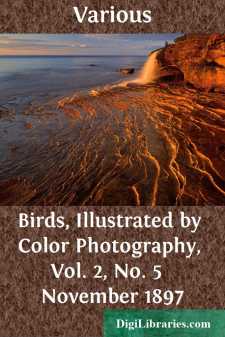
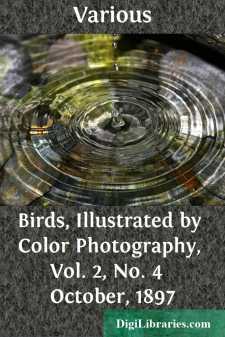

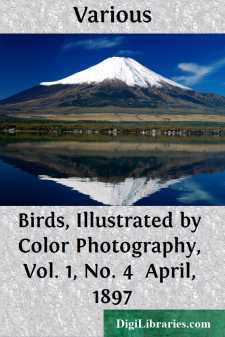
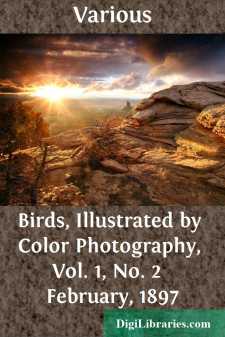
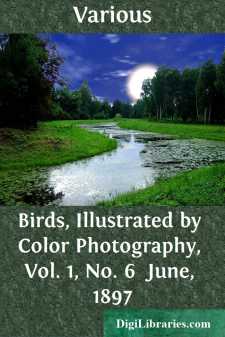

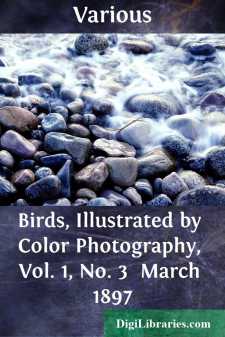
![Birds Illustrated by Color Photography [February, 1898]
A...](https://digilibraries-com.s3.eu-central-1.amazonaws.com/covers/bf714e93-ecec-43a5-8fa7-062d50d242eb.jpg)
